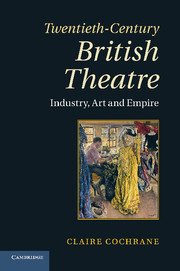Book contents
- Frontmatter
- Contents
- Acknowledgements
- Introduction
- Chapter 1 The topography of theatre in 1900
- Chapter 2 Structures of management
- Chapter 3 The profession of acting
- Chapter 4 The amateur phenomenon
- Chapter 5 The topography of theatre in 1950
- Chapter 6 The business of theatre
- Chapter 7 The changing demographic of performance
- Chapter 8 The topography of theatre in 2000
- Conclusion
- Notes
- Select Bibliography
- Index
Chapter 6 - The business of theatre
Published online by Cambridge University Press: 05 November 2011
- Frontmatter
- Contents
- Acknowledgements
- Introduction
- Chapter 1 The topography of theatre in 1900
- Chapter 2 Structures of management
- Chapter 3 The profession of acting
- Chapter 4 The amateur phenomenon
- Chapter 5 The topography of theatre in 1950
- Chapter 6 The business of theatre
- Chapter 7 The changing demographic of performance
- Chapter 8 The topography of theatre in 2000
- Conclusion
- Notes
- Select Bibliography
- Index
Summary
In his introduction to the not-for-profit sector published in 2005, Helmut K. Anheier describes it as ‘a set of organizations and activities next [my emphasis] to the institutional complexes of government, state, or public sector on the one hand, and the forprofit or business sector on the other’. The not-for-profit ‘third sector’ is effectively positioned in the middle and in its mode of operation encounters the reality that there are no clearly defined sectorial boundaries and that distinctions are quite blurred. ‘Organisations’, Anheier suggests, ‘“migrate” from one sector to another.’ In the era of public subsidy most theatre practitioners would recognise the necessity for day-to-day ‘migration’ as they attempt to balance state and civic funding with income derived from other business strategies. Whatever the proponents of theatre as a weapon of social betterment might have argued, the arts never found a secure niche within the public sector. In any case, after 1979, when the Conservative Party led by Margaret Thatcher embarked on eighteen years of government, the public sector itself had to adjust to the growing insistence on the role of the market even in the basic provision of health care and education.
While it is broadly accepted, however, as the economist Michael J. Oliver has confirmed, that the way the political landscape changed during this period had ‘profound long-term effects on the economy and society of the UK’, the immediate tangible results in terms of public-sector funding were far less obviously ideologically determined than popular historical accounts of the period have claimed. As Oliver has pointed out, even within the Conservative Party, there were groups who remained ‘implacably opposed’ to the more extreme features of the dominant market-driven microeconomic policy. Countervailing principles remained in place to disrupt and subvert at every level. Individual political affiliation within a quango, such as the Arts Council of Great Britain, was not necessarily an automatic signifier of pragmatic decision-making. This in turn impacted on the extent to which state intervention and assistance could be reined back. As I have argued throughout this book, theatre as industrial practice is positioned within a very complex economic nexus. Even at its most idealised it cannot remain isolated from the way economic factors inhibit, for example, the circulation and costs of raw materials, and, indeed, other commodities including people. Legislative change, especially in fiscal policies and industrial relations, introduces structural change into the workplace – and in building-based theatre that can mean several different categories of professional and craft skill – and inevitably influences both directly and indirectly patterns of audience composition.
- Type
- Chapter
- Information
- Twentieth-Century British TheatreIndustry, Art and Empire, pp. 171 - 206Publisher: Cambridge University PressPrint publication year: 2011



